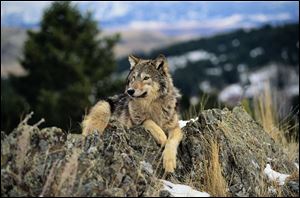Referendum sought to stop Michigan law
 Various estimates place the population of gray wolves in Michigan at
fewer than 700. The gray wolf had been on the federal endangered
species list until 2011.
Various estimates place the population of gray wolves in Michigan at
fewer than 700. The gray wolf had been on the federal endangered
species list until 2011. A referendum challenge to a new state law could delay the creation of a hunting season for the animals by a year and a half. In December, Michigan Gov. Rick Snyder signed into law Public Act 520, which gives the state Natural Resources Commission the power to decide whether a wolf-hunting season should be held.
Various estimates place the wolf population at fewer than 700, with the vast majority in the Upper Peninsula.
Sen. Tom Casperson (R., Escanaba) sponsored the bill. The measure designates wolves as a game animal and authorizes the Natural Resources Commission to establish a game season.
Senate Bill 996, also sponsored by Mr. Casperson, would build upon provisions in law to ensure livestock owners receive fair and timely compensation for animals killed by wolves, coyotes, or cougars.
“With wolf numbers far exceeding population goals, I continue to hear concerns of the impacts they are having on people’s lives and businesses,” Mr. Casperson recently told the Iron County Reporter, a publication in upper Michigan. “Residents across the Upper Peninsula have repeatedly asked for a game season to help control the wolf population, reduce livestock and pet depredation, and enhance public safety.”
A coalition of conservation and animal-welfare groups is collecting signatures to hold a referendum on whether to uphold or overturn the law. Keep Michigan Wolves Protected needs 161,305 valid signatures to put the issue on the ballot, but the goal is to collect 225,000 signatures to compensate for those that are found to be invalid, said Jill Fritz, the Michigan director of the Humane Society of the United States, one of the groups in the coalition.
 Michigan has designated the gray wolf as a game animal, but the group
Keep Michigan Wolves Protected and others want residents to have their
say.
Michigan has designated the gray wolf as a game animal, but the group
Keep Michigan Wolves Protected and others want residents to have their
say. The Michigan Department of Natural Resources has begun discussions on establishing a wolf-hunting season, but members of Keep Michigan Wolves Protected hope to head off any decisions by securing enough signatures by March 27. The 2014 referendum would prevent state officials from taking any action on the issue until voters decided the law’s fate, said Fred Woodhams, secretary of state spokesman.
Nearly 400 people attended the group’s kickoff events in Grand Rapids, Traverse City, Marquette, Saginaw, Lansing, Kalamazoo, Flint, Ann Arbor, Plymouth, and Utica, Ms. Fritz said.
“Over 1,500 people have agreed to gather signatures for the campaign, including over 300 who have committed to joining our ‘Wolf Pack’ and gather a signature for each of the 687 wolves in Michigan,” Ms. Fritz said.
The coalition has hired some paid signature collectors for the campaign “due to the extremely small window of time we have to collect so many signatures,” Ms. Fritz said. “But we are counting on the dedication of our many volunteer signature collectors to help us reach that goal.”
One Monroe County volunteer is Andrea Adams, who has been collecting signatures for several weeks.
“It’s not right to spend decades bringing the wolf back from the brink of extinction only to turn around and allow them to be killed for sport,” said Mrs. Adams of Monroe. “It’s already legal in Michigan to kill wolves in order to protect livestock or dogs. Allowing the killing of wolves just for sport is unnecessary and will accomplish nothing. People don’t eat wolves, and it’s just pointless trophy hunting for no good purpose.”
Mrs. Adams said she is repelled by wolf hunting because it involves especially cruel and unfair practices, such as painful steel-jaw leg-hold traps, hunting over bait (which involves luring the animal to a location by using bait and then killing it), and even using packs of dogs to chase down and kill wolves.
Although she has signed online animal-related petitions, Mrs. Adams never has collected petition signatures. But this issue motivated her to hit the streets, she said.
“Things are going very well,” Mrs. Adams said. “Most people I know are willing to sign. I run my own in-home pet sitting-dog walking company. I also do a lot of fund-raising and volunteering for our local humane society and other nonprofit companies who help homeless animals in our area. So most of the people I know are big animal lovers and [are] already on my side.”
The federal government in 2011 said the gray wolf population in the Great Lakes region had recovered enough to be removed from the endangered species list. Since then, hunting has begun in Wisconsin and Minnesota. Those states have much larger wolf populations than Michigan’s, according to their natural resources agencies. Wisconsin estimates that state’s wolf population at about 1,000 and Minnesota’s at about 3,000.
source


No comments:
Post a Comment